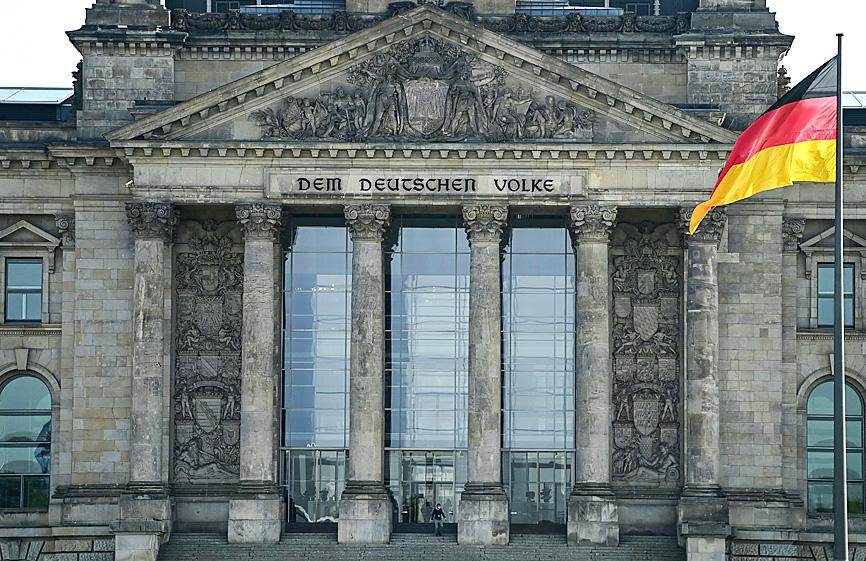Use of the phrase “democratic Taiwan” by Germany’s new coalition government in official document shows that Taiwan-China issues are not about “independence” against “unification,” but about democracy against authoritarianism, Representative to Germany Shieh Jhy-wey (謝志偉) said yesterday.
Germany’s Social Democratic Party, Free Democratic Party and the Greens — known as the “traffic light coalition” for their colors — on Wednesday inked a coalition agreement following elections on Sept. 26.
The agreement, a blueprint for their governance for the next four years, mentions “Taiwan,” which is unprecedented, showing that the new German government is paying close attention to cross-strait peace and supports Taiwan’s participation in international affairs, Shieh wrote on Facebook in Mandarin.

Photo: AFP
In particular, the word “Taiwan” is modified by the adjective “demokratisch,” German for “democratic,” he said.
“As Taiwan’s envoy to Germany, I would like to express respect and gratitude to the new German government,” Shieh wrote.
The wording highlights that Taiwan-China issues are not about unification or independence, which is how Beijing and its proxies in Taiwan frame the debate to conceal the real problem, he said.
When the debate is reduced to a choice between unification and independence, that implies it is an internal affair, excluding outside intervention, which is exactly what China wants, Shieh said.
When the framing shows that there is a struggle between democracy and autocracy, it forces observers to make a values-based assessment, he said, adding that in this context, Taiwan’s like-minded partners would strive to defend democracy and back the nation.
Shieh also thanked members of the Germany-Taiwan Parliamentary Friendship Group and the German-Taiwan Association.
The association, which earlier this year was renamed from the German-Chinese Association-Friends of Taiwan, is more than 60 years old, he said.
It is lovely to work with these people to fight for Taiwan, Shieh said.
In Taipei, the Ministry of Foreign Affairs also thanked the German government for its support.
The new coalition government has outlined its plans to promote rules-based trade, security in the Asia-Pacific region, democracy, human rights and the rule of law, ministry spokeswoman Joanne Ou (歐江安) said in a statement.
The ministry looks forward to working with the German government to deepen mutually beneficial relations and to maintain the “status quo” across the Taiwan Strait, Ou said.
The bilateral relationship has steadily deepened, Ou said, adding that over the past four years, the two sides have signed 12 pacts.
Among them is an aviation service agreement that was signed on July 15 and took effect immediately, paving the way for direct flights between Taipei and Munich, she said.

MAKING WAVES: China’s maritime militia could become a nontraditional threat in war, clogging up shipping lanes to prevent US or Japanese intervention, a report said About 1,900 Chinese ships flying flags of convenience and fishing vessels that participated in China’s military exercises around Taiwan last month and in January last year have been listed for monitoring, Coast Guard Administration (CGA) Deputy Director-General Hsieh Ching-chin (謝慶欽) said yesterday. Following amendments to the Commercial Port Act (商港法) and the Law of Ships (船舶法) last month, the CGA can designate possible berthing areas or deny ports of call for vessels suspected of loitering around areas where undersea cables can be accessed, Oceans Affairs Council Minister Kuan Bi-ling (管碧玲) said. The list of suspected ships, originally 300, had risen to about

DAREDEVIL: Honnold said it had always been a dream of his to climb Taipei 101, while a Netflix producer said the skyscraper was ‘a real icon of this country’ US climber Alex Honnold yesterday took on Taiwan’s tallest building, becoming the first person to scale Taipei 101 without a rope, harness or safety net. Hundreds of spectators gathered at the base of the 101-story skyscraper to watch Honnold, 40, embark on his daredevil feat, which was also broadcast live on Netflix. Dressed in a red T-shirt and yellow custom-made climbing shoes, Honnold swiftly moved up the southeast face of the glass and steel building. At one point, he stepped onto a platform midway up to wave down at fans and onlookers who were taking photos. People watching from inside

Japan’s strategic alliance with the US would collapse if Tokyo were to turn away from a conflict in Taiwan, Japanese Prime Minister Sanae Takaichi said yesterday, but distanced herself from previous comments that suggested a possible military response in such an event. Takaichi expressed her latest views on a nationally broadcast TV program late on Monday, where an opposition party leader criticized her for igniting tensions with China with the earlier remarks. Ties between Japan and China have sunk to the worst level in years after Takaichi said in November that a hypothetical Chinese attack on Taiwan could bring about a Japanese

The WHO ignored early COVID-19 warnings from Taiwan, US Deputy Secretary of Health and Human Services Jim O’Neill said on Friday, as part of justification for Washington withdrawing from the global health body. US Secretary of State Marco Rubio on Thursday said that the US was pulling out of the UN agency, as it failed to fulfill its responsibilities during the COVID-19 pandemic. The WHO “ignored early COVID warnings from Taiwan in 2019 by pretending Taiwan did not exist, O’Neill wrote on X on Friday, Taiwan time. “It ignored rigorous science and promoted lockdowns.” The US will “continue international coordination on infectious